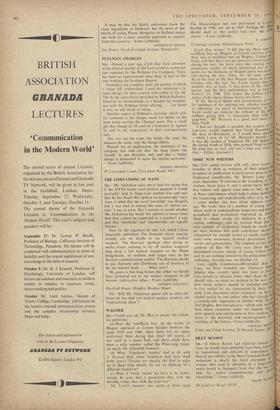WAGNER Snt,—Could you ask Mr. Ray to answer the follow-
ing questions:
(a) How the 'unofficial ban' on the works of Wagner operated at Covent Garden between the years 1939 and 1946, when there was no opera performed there during that time? Of course, it was used as a dance hall, and there might have been a nifty number called the Prize-song tango, on which Mr. Churchill frowned. . . .
(h) What 'Napoleon's toadies' had to do with A Masked Ball, when Napoleon had been dend forty years? Toadies are usually the first to wake up to these little details. Or are we thinking of a different Napoleon?
(r) Why, if Verdi 'meant' his hero to be homo- sexual, he gave him a passionate duet with the heroine, rather than with the page-boy?
Mr. I.evin's memory also seems at fault, since
The Mastersingers was not performed at Covolt Garden in 1946; nor yet in 1947. Perhaps Mr. Ra?, should stick to 'the undue fuss over the 195' clarets.'—Yours faithfully.
R. BARN
[Cyril .Ray writes: `I did not. say there was Old
18 George Avenue, Brightlingsea, Essex
unofficial ban on Wagner at Covent Garden; I there was an unofficial ban on Wagner. I know ea fectly well that there was no opera at Covent Garden, during the war, but there were two touring OP'!, companies, neither of which performed any ot 111. works for the duration; no Wagner opera was broad cast during the war, either, for the same reasor As to the date of the first Wagner opera at C'oycl!. Garden after the war, Mr. Levin regrets tha(_11 memory was at fault. It was given in the 1941-4 season, and the first performance was in fact. or, January 21, 1948. This makes the politico-araNlb policy of the Opera House worse, not better. 'If Mr. Barnard thinks that protestations of for members of the opposite sex, whether musied",i or otherwise, are proof of heterosexuality, or Verdi could not indicate his attitude to the without giving him "a passionate duet with page-boy," Mr. 'Barnard is a good deal more than Verdi. 'I had not thought it possible that readers of Spectator would suppose that Verdi flourished.ld the days of Bonaparte, or I would have speci1 —which I now do for Mr. Barnard's benefit— t'1,;', it was the toadies of Napoleon III, still shaken the Orsini bomb of 1858, who pressed Verdi to r11:1"1 his king into an earl, and one a long way awa). that:—Editor, Spectator]


































 Previous page
Previous page